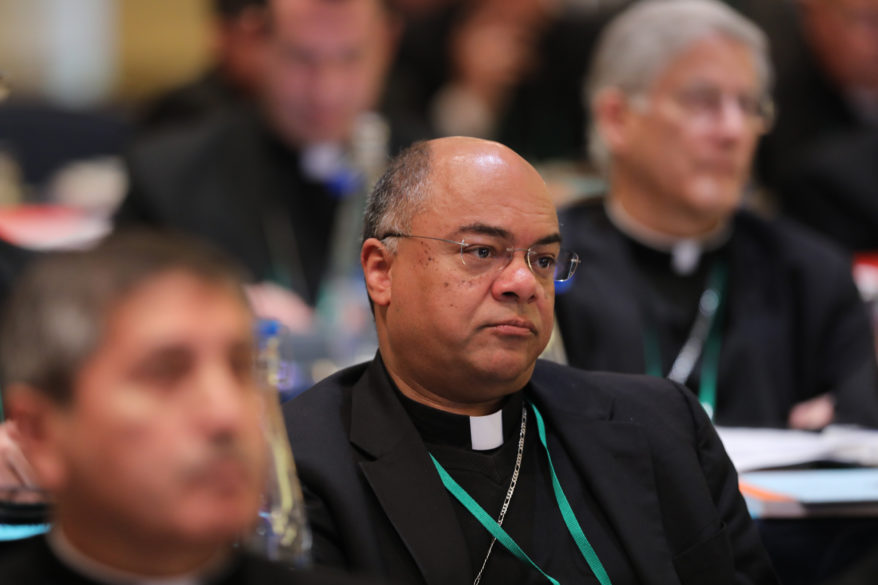By Carol Zimmermann
BALTIMORE (CNS) – During their Nov. 11-13 meeting in Baltimore, the U.S. bishops elected new officers and discussed challenges in the church and the nation. They spoke of their renewed efforts to help immigrants, youth and young adults, pregnant women and the poor as well their steps to combat gun violence and racism.
On the second day of the meeting, Nov. 12, the bishops elected Archbishop Jose Gomez of Los Angeles to a three-year term as president of the U.S. Conference of Catholic Bishops and Archbishop Allen H. Vigneron of Detroit as conference vice president.
Archbishop Gomez, the first Latino to be elected to this role, was chosen with 176 votes from a slate of 10 nominees.
At the start of the meeting, the bishops voted overwhelmingly on a revised set of strategic priorities to take them into the next decade. The next day, they approved adding new materials to complement “Forming Consciences for Faithful Citizenship,” their long-standing guide to help Catholics form their consciences in public life, including voting.
Bishops also heard a wide-ranging report on immigration Nov. 12, which included updates of policy, how programs to resettle refugees, including those run by the Catholic Church, have closed or reduced activity because the administration has moved to close the country’s doors to those seeking refuge, and efforts on the border to help asylum cases.
The bishops’ second day of meetings also included a presentation of the pope’s document “Christus Vivit,” which was issued following the 2018 Synod on Young People. Bishop Frank Caggiano of Bridgeport, Connecticut, a delegate at the synod, urged bishops to do more to support Catholic teens and young adults and to use the pope’s apostolic exhortation as their guide.
The previous day, Auxiliary Bishop Robert Barron of Los Angeles told the bishops the church is losing young people in greater numbers and must face the challenges of how to get the religiously unaffiliated, or “nones,” particularly young people, back.
He presented a three-minute video on the issue and spoke of his concerns and ideas for bringing young people back to church which involved: not dumbing down the faith and involving young people in the social justice aspects of the church. Discussion about this from the floor lasted for more than an hour with bishops from across the country agreeing that the issue is of great concern and sharing other ideas to bring young people back which primarily involved catechism but also an increased devotion to Mary.
The bishops also heard that a new “pastoral framework for marriage and family life” should be ready for a vote by the U.S. bishops by next November at the latest, according to Archbishop Charles J. Chaput of Philadelphia, chairman of the U.S. bishops’ Committee on Laity, Marriage, Family Life and Youth.
At the start of their meeting Nov. 11, the bishops raised pressing issues that included the priesthood shortage, gun violence and the need to provide support services for pregnant women.
Archbishop Christophe Pierre, papal nuncio to the United States, mentioned some of these challenges in his opening remarks, along with the need to welcome migrants and fight racism. He also urged the bishops not just to focus on the challenges before them but to consider how they could further develop collegiality and collaboration with one another.
In his final address as president of the U.S. Conference of Catholic Bishops, Cardinal Daniel DiNardo of Galveston-Houston told his fellow bishops that it has been “an honor to serve you, even in the difficult times.”
“Let’s begin anew,” he said, at the close of his address.

In a presentation on gun violence, Bishop Frank Dewane of Venice, Florida, said Catholic clergy and lay leaders can play a role in bringing together people along the rural-urban divide to build understanding of the need for sensible policies that can end the scourge of gun violence.
The bishop, who is chairman of the U.S. bishops’ Committee on Domestic Justice and Human Development, outlined the USCCB’s long-held stance of the need for “common sense” legislation that governs the availability of guns. He also said it was time for people to come together so that there is greater understanding of how gun violence affects urban communities in particular.
He told Catholic News Service that the USCCB’s work on the legislative front was important, but that a pastoral response to gun violence was needed.
“It’s time for a different approach,” he said.
In a new approach for the bishops’ pro-life efforts, Archbishop Joseph Naumann of Kansas City, Kansas, invited his fellow bishops to devote a year of service to pregnant women starting next March.
He said Catholic parishes can be one of the first places a woman facing an unexpected pregnancy can turn to for assistance rather than think of seeking an abortion and they could offer a variety of support services to women who may be thinking about whether to carry their child to term.
The bishops also voted for a new sixth edition of of the U.S. Conference of Catholic Bishops’ existing Program of Priestly Formation for U.S. dioceses; before it can be implemented, it must first receive approval, from the Vatican Congregation for the Clergy. They approved a text translation to be used in the Order of Christian Initiation of Adults and OKd close to 300 new hymn texts for the Liturgy of the Hours.
The three-day meeting wrapped up Nov. 13 with a presentation by Bishop Shelton Fabre of Houma-Thibodaux, Louisiana, chairman of the U.S. bishops’ Ad Hoc Committee Against Racism, who spoke about the ongoing work of the committee, highlighting the listening sessions that have taken place around the country.
At the meeting’s close, Archbishop Gomez thanked outgoing president Cardinal DiNardo for his “excellent service to this body and to the church.”
(Contributing to this report was Rhina Guidos, Mark Pattison and Dennis Sadowski.)
